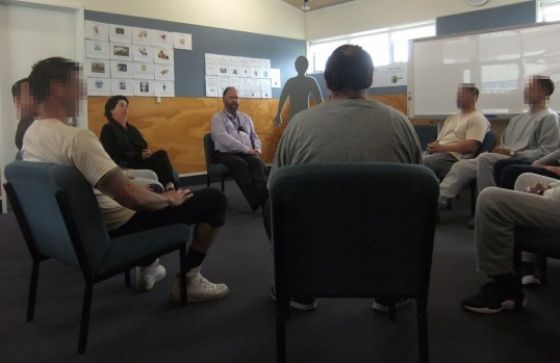 Increasing public awareness of how psychology can help people families and communities find ways to increase their psychological wellbeing, is the aim of a national Psychology Week running from 10-16 May.
Increasing public awareness of how psychology can help people families and communities find ways to increase their psychological wellbeing, is the aim of a national Psychology Week running from 10-16 May.
At Corrections we employ over 200 registered psychologists (and are currently recruiting for vacancies in several locations) who work directly with people under our management, either in group programme settings or one-on-one. In 2019/20, 534 people in prison and 391 people in the community benefited from one-on-one treatment from one of our psychologists.
Our Special Treatment Units host our most intensive psychologist-led programmes.
Matapuna is a 60 bed Special Treatment Unit at Christchurch Men’s Prison where the STU:VO (Special Treatment Unit: Violent Offending; formerly known as STURP) and STU:ASO (Special Treatment Unit: Adult Sexual Offending; formerly known as ASOTP) are run. Programmes are delivered by psychologists alongside Programme Facilitators. Typically five programmes are run there per year, usually with 10 men starting each group. The unit celebrated its 10 years last year meaning over 500 men have started programmes in this unit alone.
These programmes incorporate psychological treatment models such as Cognitive Behavioural Therapy, Dialectical Behaviour Therapy, and Acceptance and Commitment Therapy, and are run in a Therapeutic Community environment where all men in the unit are ideally taking part in a programme and regular community meetings are held. Men are typically in the unit for approximately a year, entering and taking part in the Rolling Starters group, before commencing their core group (either STU:VO or STU:ASO) for about 9 months, and then attending a Graduates group and taking more senior roles within the community (e.g., chairing community meetings, trusted employment roles, welcoming and mentoring new community members).
Given that these programmes are delivered to men assessed at high risk of re-offending (and usually have lengthy histories of serious offences), being effective with these people can have a significant effect in reducing harm to the community.
“While the programmes aren’t perfect for everybody, the below example is one of many psychological interventions that have helped many people within our system,” says Senior Adviser and Registered Psychologist Nick Farrelly.
Nick adds that RQ** data consistently shows a reduction in re-offending and these are consistently some of the best performing rehabilitation programmes.
Lived experience Every 6-12 months or so staff who worked with Brad*, who graduated the ASOTP in 2016 and was released in 2017, get a friendly call from him. “Typically the calls involve him letting us know how well he is doing (full-time truck driver for four years, healthy relationship with his long-term partner, regular contact with his children and moko) and how much he is enjoying life, and thanking us for helping him.” – Therapist at Matapuna Special Treatment Unit “Brad always tells me that it is Matapuna that made this life he has now possible. Before engaging in treatment here, he was fearful of a life outside of jail and thought that being an active gang member would be the only way he could survive it. He describes that it was during treatment that he realised he had the potential to be a normal person who others care about. He describes one of the most meaningful events of his time at Matapuna being during a role play where he had to pretend to be a police officer responding to a sexual assault, because it enabled him for the first time to see people in authority as human and trying to help. Brad is very proud that the Police in his area don’t stop him anymore because they know him and trust that he will be doing the right thing.” |
|---|
*not his real name
** The Rehabilitation Quotient (RQ) measures the impact of the Department’s rehabilitative programmes, through comparing the rates of reconviction and reimprisonment among ‘treated’ offenders (who completed a rehabilitative intervention) with the rates observed among ‘untreated’ offenders (offenders who are matched based on a range of risk-related factors, but who had no involvement in that specific programme).
View Psychologist roles on our Careers website. Filter by Psychology, Counselling and Social Work

